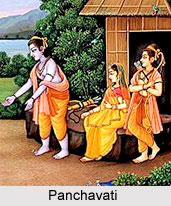 In Hindu mythology, as outlined in the epic Ramayana, Panchavati was the place in the Forest of Dandakaranya (Dandaka Kingdom), where Lord Rama built his home along with his wife Sita and brother Lakshmana during their period of exile in the wilderness. By the advice of the Sage Agastya, this blooming valley was selected by Lord Rama and Lakshmana for their hermitage when they were in exile. Thus, Panchavati is believed to be a shelter to Lord Ram, Lakshman, and Sita during their exile. River Godavari flows through Nashik and its northern part is called as Panchavati.
In Hindu mythology, as outlined in the epic Ramayana, Panchavati was the place in the Forest of Dandakaranya (Dandaka Kingdom), where Lord Rama built his home along with his wife Sita and brother Lakshmana during their period of exile in the wilderness. By the advice of the Sage Agastya, this blooming valley was selected by Lord Rama and Lakshmana for their hermitage when they were in exile. Thus, Panchavati is believed to be a shelter to Lord Ram, Lakshman, and Sita during their exile. River Godavari flows through Nashik and its northern part is called as Panchavati.
Etymology of Panchavati
Panchavati literally means "a garden of five banyan trees". There are five (Pancham) Banyan trees (Vat Vriksha) and hence the area is called Pancha-Vati. It is believed to be a part of the Dandakaranya Forest. These trees are said to have been there during the exile of Lord Rama.
Legend of "Aranya Kanda" of Ramayana in Panchavati
In Panchavati, Lakshmana built a bamboo cottage in a tranquil area for Rama and Sita to reside. At this site Surpanakha (Ravana"s sister) came to entice Rama failing which she got disfigured by Lakshmana. Her brothers, Khara and Dhushana, who came to her defence along with a bunch of other demons were defeated and killed by Rama and Lakshmana. The aftermath of this brought Ravana into the scene with a wicked plan to abduct Sita. It was from this hermitage that Ravana afterwards carried off Sita. The plan was that Ravana"s uncle Maricha to assume the form of a golden deer to entice Sita, lure Rama in pursuit of it, and draw Lakshmana too away from the scene at which time Ravana would swoop in to carry Sita away. Panchavati is the place that witnessed the precipitous event of the abduction of Sita and thus marks the turning point in the epic leading to the war in Lanka and eventual destruction of Lanka and the annihilation of Ravana.
There is a place called Tapovan where Lakshmana, the brother of Rama, cut off the nose of Surpanakha, the sister of Ravana, when she attempted to kill Sita. The entire Aranya Kanda of Ramayana is set in Panchavati.




















